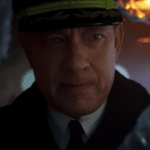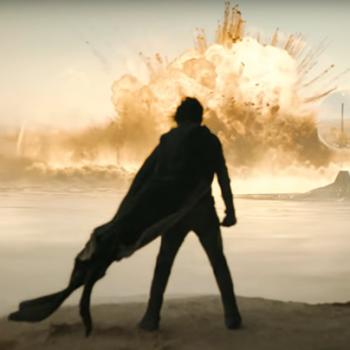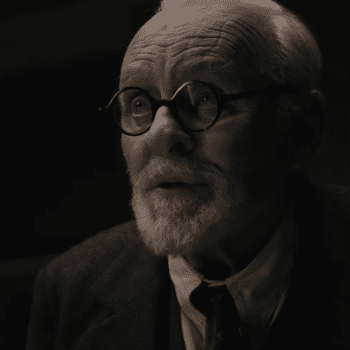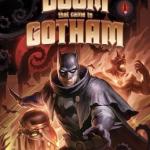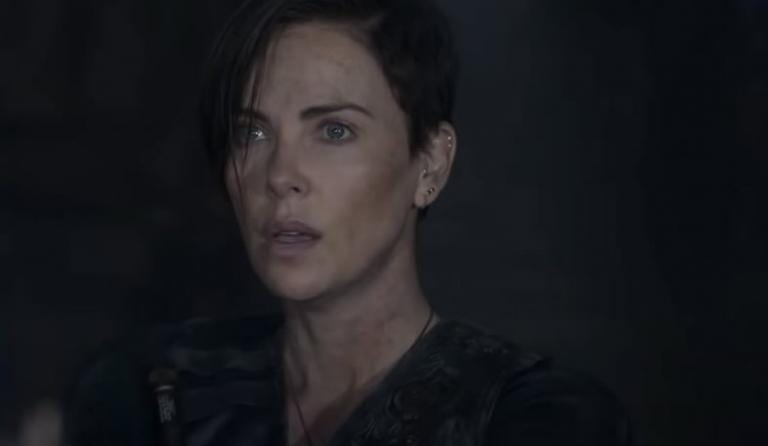
You wouldn’t think that Andy from Netflix’s The Old Guard would have much to do with good old George Bailey from It’s a Wonderful Life. George is a decent family man and beloved Bedford Falls citizen. Andy is an immortal warrior who, we’re told, has forgotten more ways to kill than whole armies have ever known.
Still, if you ever got them together at a dinner party—and wouldn’t that be something if you did—they’d have more in common than you’d think.
Her Days are Full of Sorrow
Andy (Charlize Theron) is old. Real old. She won’t tell anyone just how old she is, but she lets drop that she’s a Scythian. Scythians were nomadic warriors that roamed what are now the Russian steppes from around 900 to 200 B.C. That’s a long time to be pulling in breath, and it’s a very long time to be a top-notch killer—which Andy is. Being immortal helps: If she gets shot or stabbed or even blown up, her body eventually stitches itself back together. And then there’s the 2,000-3,000 years of practice she’s had. All of it has allowed Andy to play life like a 16-bit videogame with eternal continues.
But gamers of a certain age know that 16-bit games can feel a little tiresome after a while.
Andy’s been playing the same game for millennia, and part of her would like it to be done—type in her high score and walk away. It’s not just that she’s tired and bored (though maybe she’s that, too). But she’s suffered a lot in the centuries. She’s lost plenty of people whom she loved and committed acts she’s ashamed of. She tells Nile, a newbie immortal, that she feels every kill she makes. They take a toll, Andy admits.
But here’s the saddest part: If Andy felt like she was making a difference in the world—if she was somehow making it better—she could deal with the pain and the sorrow and the plain ol’ tedium that comes with immortality. If she felt like her long life had meaning, Andy would happily accept her lot.
But Andy feels like anything she does in the world—no matter how many children she saves or bad guys she kills—the world doesn’t get any better.
“It’s getting worse,” she says. And then, sinking into nihilism, she adds, “The world can burn for all I care.”
We don’t know if Andy ever had any strong belief in the Almighty. But her disillusionment (and an unfortunate run-in with the Church during the Middle Ages) killed whatever faith she might’ve had. When she sees Nile praying, Andy mocks her.
“God doesn’t exist,” Andy says with a smirk.
“My God does,” Nile insists.
But it’s no good. After centuries of asking questions—How come I never die? Why me?—the world has been too stingy with its answers. She can find no purpose for her gift: Thus, she has no purpose. And neither does the world.
“None of it means anything anyway,” she says.
And yet, for her lack of faith, she sounds much like Solomon, the writer of the book of Ecclesiastes. You could almost picture her reciting whole chapters from it, speaking straight from the heart:
What has a man from all the toil and striving of hear with which he toils beneath the sun? For all his days are full of sorrow, and his work is a vexation. Even in the night his heart does not rest. This also is vanity. (Ecclesiastes 2:22-23, ESV)
Andy would resonate with the King James version of the book’s 14th verse: “I have seen all the works that are done under the sun; and indeed, all is vanity and grasping for the wind.”
George Bailey could relate, too.
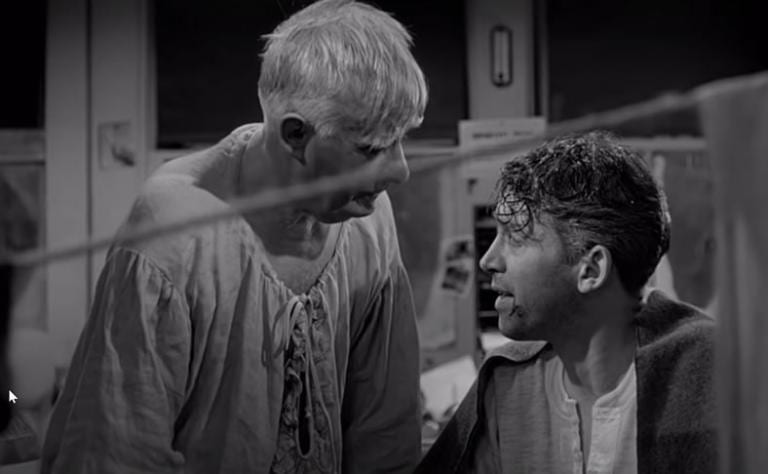
From Never Die to ‘Never Been Born’
George Bailey in It’s a Wonderful Life isn’t burdened with a couple thousand years of manic killing. But he has had a very rough day. All his life, like Andy and her crew of immortals, he’s tried to fight for what he thought was right—not with a gun and axe, but with a Building and Loan. Though he once wanted to travel the world, he gave it all up to do battle with miserly banker Mr. Potter. Through low-interest loans and sensible spending accounts, George tries to give the honest citizens of Bedford Falls a chance to better their lives. And, in so doing, they better the community.
But when George’s Uncle Bailey loses the day’s bank deposit–$8,000 in 1946 money—George feels that all his hard work will lead to a tragic endpoint: scandal, bankruptcy, disaster. There’s only one way George feels like he can raise that kind of cash: Kill himself. The life insurance money should cover the debt.
No big loss. After all, no one would miss him.
“If it hadn’t been for me, everybody’d be a lot better off,” he says. “I suppose it’d been better if I’d never been born at all.”
George Bailey (Jimmy Stewart) wasn’t just desperate to raise that $8,000, whatever the personal cost. He was at a place where he’d felt like his life had been wasted. It had had no meaning. George wasn’t perhaps quite as Ecclesiastical as Andy was, but his thoughts came from the same well.
In my Bible’s introduction to Ecclesiastes (Crossway’s ESV Study Bible), the writer says that the book is primarily concerned with the meaning of life, and how it leads to the overarching story of salvation. “It calls each of God’s people to own the story, and it dignifies each won with a role in the further outworking of the story,” the intro writer says. “Nevertheless it is impossible for any human being to fully grasp how his or her decisions will contribute to God’s grand scheme; and Ecclesiastes helps people to see that they do not have to understand this.”
And that’s where both The Gold Guard and It’s a Wonderful Life depart from Ecclesiastes. George and Andy are both given an opportunity to see how their lives have impacted the world around them.
In It’s a Wonderful Life, George’s guardian angel (Clarence) shows him what an impact he’s made in the lives around him: That his decisions worked for God’s greater good. George is given that “impossible” gift: To see his piece in a wider story.
The Old Guard, being the R-rated actioner it is, doesn’t lean into guardian angels as much. But (without giving anything critical away) Andy is given the opportunity to see how she and her team have impacted the world for the better: One child they save might rescue hundreds of people from the Khmer Rouge, or create an important treatment for a disease, or even prevent a nuclear disaster. Or their daughter or granddaughter might.
“She saves a life, and two or three generations later, we reap the benefits,” someone says of Andy.
Like George, Andy, in her own more secular way, rediscovers meaning in what she had thought had been a very long, very meaningless life. And she lands in much the same place as Solomon did. “We don’t have all the answers, but we do have purpose,” Andy says. And so they do.
And with that purpose comes, oddly, a renewed sense of faith. No longer is Andy’s immortality pinned to a sense of futile nothingness. She and her team’s lives have meaning—and Andy seems to open her mind to the idea that that meaning might be orchestrated by a higher hand. Suddenly, Nile’s faith doesn’t seem quite so laughable.
One of the things I love about the Bible is how honest it is—far more honest than we Christians can be—about the hard realities of this fallen world. We suffer. We struggle. Sometimes God feels so distant. Sometimes life feels empty, and we wonder what’s the point of it all.
But as George and Andy had the chance to see, we are indeed part of a bigger tapestry. We’re just too close to see the full picture, that’s all.



